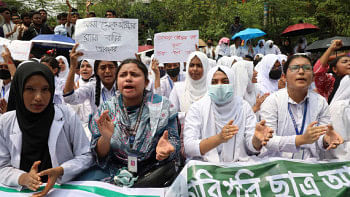Govt not bound to enact law
By passing a private member's resolution on the war crimes trial last Thursday, Parliament in fact expressed its opinion on the matter. The resolution says: “Parliament's opinion is that legal provisions be enacted to take action against those obstructing the war crimes trial…”And it is not binding upon the government to move for enacting a law to implement this resolution. Rather it is the government's discretion whether it will follow the resolution or not.
However, some ministers, including Suranjit Sengupta, since the passage of this resolution have been claiming that the government is now bound to implement the resolution.
But the truth is different. Local and foreign parliamentary affairs experts' views do not support Suranjit and his colleagues.
“Since the purpose of such resolutions is merely to obtain an expression of opinion of the House, the government is not bound, as convention has it, to give effect to opinions expressed in these resolutions. It entirely rests on the discretion of the government whether or not it will take action suggested in such resolutions,” say two Indian experts, MN Kaul and SL Shakdher, in their book “Practice and Procedure of Parliament.”
The above interpretation is equally applicable in parliamentary practice in Bangladesh as both countries follow almost similar parliamentary procedures. Moreover, Bangladeshi parliamentarians and experts depend largely on Kaul and Shakdher.
Bangladeshi parliamentary affairs expert Khandaker Abdul Haque explained the effectiveness of private members' resolutions in his book, “Parliamentary Practice and Procedure”, published by Bangladesh Parliament Secretariat. His views are the same as those of Kaul and Shakhder.
Both Indian and Bangladeshi experts, however, say if parliament passes a resolution or motion in line with a constitutional provision, then it gets the status of a law and there is no scope to consider it as an “opinion” or “recommendation” of Parliament.
In Bangladesh's constitution, there are some provisions of such resolutions on disapproval of an ordinance, impeachment of the president, removal of the president on health grounds, removal of the speaker and the deputy speaker, and approval of the state of emergency.
However, Suranjit Sengupta and his colleagues in the cabinet and the party may continue airing the same claim in the wake of the current political situation. The ruling Awami League-led alliance has been accusing the main opposition BNP of creating obstacles to holding the trial. Some statements and remarks by opposition leaders and their alliance with the anti-liberation Jamaat-e-Islami, however, paved the way for the AL-led alliance to launch and gear up the campaign. And the ruling parties have been using this opportunity to reject the opposition agitation for a restoration of the caretaker government system by saying the movement is aimed at protecting war criminals and creating obstacles to the trial.
The resolution has already triggered fresh controversy over the trial of war criminals. Senior BNP leaders have claimed the resolution was passed with the aim of suppressing and foiling the opposition movement for the restoration of the caretaker government.
Statements made by Law Minister Shafique Ahmed and State Minister Qamrul Islam have also sparked fears in the public mind. They have said any Criticism of the war crimes trial will be treated as obstruction. If criticism is not allowed, it will appear as a threat to freedom of thought, conscience and speech, which will be against people's fundamental rights as guaranteed by the constitution.
Therefore, if the government really moves to enact a law following the resolution, it may create more political hue and cry, which may not be good for the ongoing trial of war criminals.
Thursday's resolution on the war crimes trial may also be questioned on legal grounds. The Rules of Procedure of Jatiya Sangsad provide some restrictions on admissibility of resolutions. According to section 133(IV) of the Rules of Procedure, no resolution shall relate to any matter which is under adjudication by a court of law having jurisdiction in any part of Bangladesh.
And, according to section 134, a resolution seeking to raise a discussion on the matter pending before any statutory tribunal or statutory authority performing judicial or quasi-judicial functions shall not be allowed to be moved in the House.
As per Rules of Procedure, a copy of Thursday's resolution was sent to the law ministry, which was against passage of the resolution as the existing laws themselves allow taking action against those obstructing the war crimes trial. And the law minister will inform parliament at its next session, if not earlier, of action, if any,taken by the government on the resolution.

 For all latest news, follow The Daily Star's Google News channel.
For all latest news, follow The Daily Star's Google News channel. 



Comments